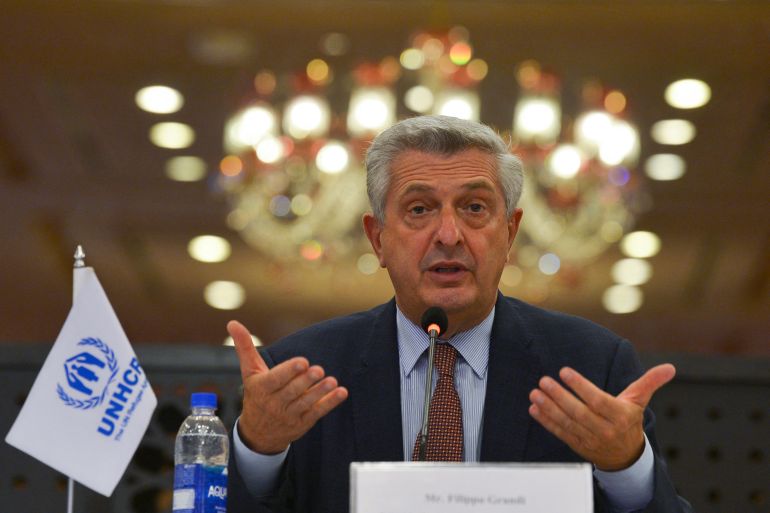UN refugee chief calls for action to prevent Afghan ‘implosion’
Speaking from Islamabad, Pakistan, Filippo Grandi raises concern over lack of functioning of Afghan state institutions due to frozen government assets.

Islamabad, Pakistan – United Nations High Commissioner for Refugees Filippo Grandi has called on countries worldwide to engage with the Taliban’s interim government in Afghanistan or risk a “humanitarian crisis” resulting from the collapse of the state.
His comments in the Pakistani capital, Islamabad, on Friday followed a visit to Afghanistan this week and two days of talks with Pakistani leaders.
Keep reading
list of 4 itemsPhotos: Tourist numbers up in post-war Afghanistan
Taliban ban on girls’ education defies both worldly and religious logic
Afghanistan calls for ‘respect’ after Cricket Australia snub
The UN refugee chief said that while humanitarian assistance had been pledged to address immediate food and other shortages, the issue of frozen Afghan government assets leading to a lack of functioning of state institutions was a core concern.
“It is important that the international community finds the necessary direction, the necessary ways to ensure the functioning of Afghanistan,” he said.
“Because an implosion of Afghanistan, the collapse of public services for example like health or education, if the state ceases to function, then this will provoke a crisis that is much bigger than humanitarian.”
At a UN-organised donor conference on Monday, world powers pledged more than $1bn in immediate humanitarian assistance to address poverty, food and medical shortages in Afghanistan following the Taliban takeover last month.
Roughly $10bn in Afghan central bank assets remain frozen in foreign accounts, however, notably with the United States Federal Reserve.
“I think it is important that we, in the UN, the international community continues to engage with the Taliban, in order to go forward and to save Afghanistan from disaster, and to save the region from instability,” said Grandi.
While in Afghanistan, Grandi met the interim ministers of foreign affairs, education, rural development and refugee repatriation. He is the second high-level UN official, after Emergency Relief Coordinator Martin Griffiths, to have visited the country since the Taliban seized control of the capital, Kabul, on August 15.
Pakistani concerns
In Pakistan, Grandi met several senior officials, including powerful army chief General Qamar Javed Bajwa, President Arif Alvi and Interior Minister Sheikh Rashid Ahmed, among others.
Pakistan is home to 1.4 million registered Afghan refugees, according to UN data, many of whom have lived in the country for decades, since migrating after the Soviet invasion of Afghanistan in the late 1970s, the war that followed and the US invasion in 2001.
The Pakistani government estimates there are a further two million Afghan refugees who are living in the country without documentation.
Since August, Pakistan’s government has repeatedly stated that it will not allow any new Afghan refugees to enter the country.
“Pakistan is in no condition right now to accept any more refugees,” Mooed Yusuf, Pakistani Prime Minister Imran Khan’s national security adviser, said at a press briefing on Wednesday.
“We will do whatever we can for our Afghan brothers and sisters, but the world has to take this responsibility to ensure that we prevent a humanitarian crisis.”
According to preliminary UN estimates, at least 9,290 new Afghan refugees have arrived in Pakistan since mid-August, most through the southern border crossing at Spin Boldak-Chaman.
At least 250 of those refugees have been deported so far, Pakistani provincial authorities told Al Jazeera this week.
Grandi said that while he sympathised with Pakistan’s position, there may be among them people who need to be protected.
“Pakistan wants to be very cautious, wants to check who is coming in, they have asked that people who are coming in are properly documented,” he said.
“My point was that sure I understand, but maybe among those that are not documented may be cases where if you send them back, they are at risk on the other side.”
Grandi said officials from the UN’s refugee agency would be conducting visits to border crossings at Torkham and Chaman in the coming days to assess the situation of any incoming refugees.
“It would be good to have a kind of system for these cases so that we don’t expose anybody unnecessarily to risk, but we also don’t open up the border for a flood into Pakistan, which I don’t think is the case now, but Pakistan is worried about that and I can understand that concern.”
Asad Hashim is Al Jazeera’s digital correspondent in Pakistan. He tweets @AsadHashim.